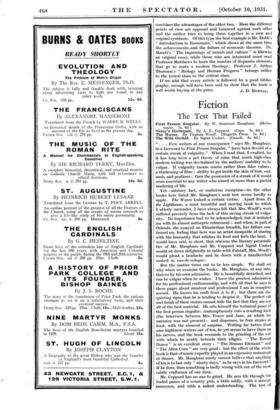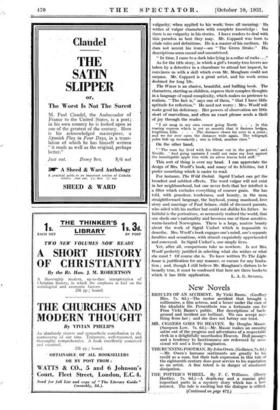Fiction
The Test That Failed • • • FEW writers of any consequence " says Mr. Maugham, in a foreword to First Person Singular, " have been devoid of a certain streak of vulgarity." When I read that, I exulted, for it has long been a pet theory of mine that much high-class modern writing was devitalized by the authors' inability to be vulgar. If vulgarity means coarse rather than false values : a thickening of fibre : ability to get inside the skin of lout, cad, snob, and profiteer : then the possession of a streak of it would seem essential to any writer who aimed at more than a partial rendering of life.
Yet—salutary fact, or malicious exception—to the other books here listed Mr. Maugham's acid test seems hardly to apply. The Waves looked a certain victim. Apart from To the Lighthouse, a most beautiful and moving book to which I utterly surrender, I have always felt that Mrs. Woolf's work suffered precisely from the lack of this saving streak of vulga- rity. Its had to be acknowledged, but-it irritated me with its almost antiseptic refinement : and when, in part of Orlando, she essayed an Elizabethan breadth, her failure con- firmed my feeling that here was an artist incapable of sharing with the humanity that relishes its food and feels the heat. I would have said, in short, that whereas the literary personali- ties of Mr. Maugham and Mr. Coppard and Sigrid Undset would sit down delightedly to table with Falstaff, Mrs. Woolf's would plead a headache and lie down with a handkerchief soaked in eau-de-cologne.
But the matter turns out to be less simple. We shall see why when we examine the books. Mr. Maugham, at any rate, thrives by his own admission. He is beautifully detached, and can be vulgar when he wishes. I have the greatest admiration for his professional craftsmanship, and with all that he says in these pages about amateur and professional I am in complete accord. He knows his craft from A to Z ; but there are dis- quieting signs that he is tending to despise it. The perfect cut and finish of these stories cannot hide the fact that they are not all of the best material. He sets himself the technical poser of the first person singular : contemptuously cuts a resulting knot (the interview between Mrs. Tower and Jane, at which his narrator was not present) : and dispenses, in four stories at least, with the element of surprise. Writing far better than nine highbrow writers out of ten, he yet seems to have them on his nerves, and the book resounds to the grinding of the axe with which he neatly beheads their effigies. " The Round Dozen " is an excellent story : " The Human Element " and " The Alien Corn " are very good : but the effect of the whole book is that of music expertly played in an expensive restaurant at dinner. Mr. Maugham surely cannot believe that anything of his is to last only " ninety days," as he says in his foreword ? If he does, then something is badly wrong with one of the most subtle craftsmen of our time.
Mr. Coppard has no axe to grind. He sees life through the leaded panes of a country pub, a little oddly, with a strange innocence, and with a naked understanding. The test of vulgarity; when applied to his • wdrk;' ffses -alfTrielarang. -He
- writes of vulgar characters with complete knowledge : but there is no vulgarity in his stories. I leave readers to deal with this paradox as best they may. Mr. Coppard was born to elude rules and definitions. He is a master of his medium. He does not accent his irony—see " The Green Drake." His descriptions seem casual and uncontrived.
" In time, I came to a dark lake lying* a collar of rocks . . ."
As for the title story, in which a girl's twenty-two -lovers are taken by a detective in a charabanc to attend her inquest, he convinces us with a skill which even Mr. Maugham could not surpass. Mr. Coppard is a great artist, and his work seems destined for long life.
The_Waves is an elusive, beautiful, and baffling book. The characters, starting as children, express their complex thoughts in a language of equal complexity, which makes no pretence to realism.. " The fact is," says one of them, " that I have little aptitude for reflection." He need not worry : Mrs: Woolf will make good his deficiency. Her powers of observation are little short of marvellous, and -often an exact phrase- sends a thrill of joy through the reader.
" I sit snug in any own corner going North . . . in this roaring express which is yet so smooth that it flattens hedges, lengthens hills. . . . The distance closes for ever in a point ; and we for ever open the distance wide again. The telegraph poles bob up incessantly ; one is felled, another rises."
On the other hand,
" The man lay livid with his throat cut in the gutter,' said Neville. ' And going upstairs I could not raise my foot against the immitigable apple tree with its silver leaves held stiff.' "
This sort of thing is over my head. I can appreciate the design of Mrs. Woolf's book, and many of its felicities, but I prefer something which is easier to read.
For instance, The Wild Orchid. Sigrid Undset can get the broadest and subtlest effects. The word vulgar will not exist in her neighbourhood, but one never feels that her intellect is a filter which excludes everything of coarser grain. She has told, with grandeur, tenderness, and beauty, in the most straightforward language, the boyhood, young manhood, love story and marriage of Paul Selmer, child of divorced parents, who sided with his mother but could not dislike his father. So faithful is the portraiture, so accurately realized the world, that one sheds one's nationality and becomes one of these sensitive, warm-hearted Norwegians. There is a large, austere beauty about the work of Sigrid Undset which is impossible to describe. Mrs. Woolf's book engages one's mind, one's separate faculties and sensations, with stimuli exquisitely apprehended and conveyed. In Sigrid Undset's, one simply lives.
Yet, after all, comparisons take us nowhere. Is not Mrs. Woolf perfectly justified in selecting what she wishes or what she must ? Of course she is. To have written To The Light- house is justification for any manner, or excuse for any limita- tion ; and, though I still believe Mr. Maugham's dictum to be broadly true, it must be confessed that here are three books to which it has little application. L. A. G. SVIONG,



















































 Previous page
Previous page